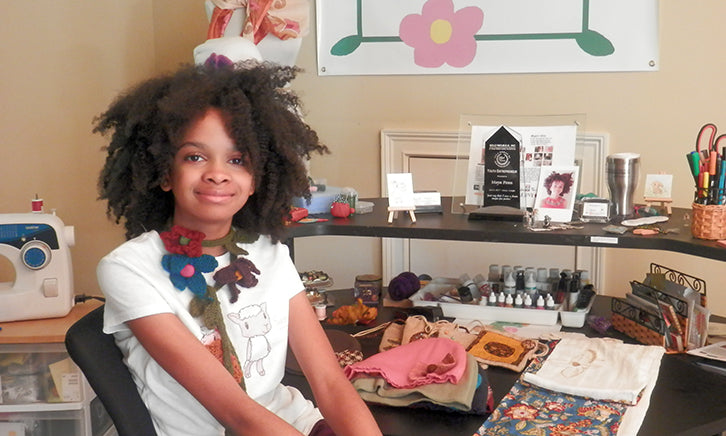A 12-year-old pitches his business on Shark Tank. I’m watching it now on YouTube. At three times his age, hand plunged halfway into a bag of Cheetos, I realize: I am an underachiever.
Have you ever wished that you could break the space-time continuum and deliver wisdom from the future to your teenage self? What life lessons, learned the hard way, would you impart?
My first business was a Kool-Aid stand. It’s a fairly unremarkable start for an entrepreneur, but the simple goods for cash exchange (sugar-water, 25 cents) was enough to awaken my inner #girlboss. It wasn’t until after college, however, that I took a real stab.
While holding down a “career” by day, I squinted into a sewing machine light by night (I now require eyeglasses, but I digress) and peddled my handcrafted goods via local and online markets.
I was born with entrepreneur baked in, but squandered it during my prime: I will never have the energy, time, and resources I had as a teenager. Hindsight, right? In this post, I’ll share all of the advice I’d give my teenage self if I ever get my Marty McFly moment. “Start a business!” I’d shout, shaking my own shoulders.
But, what else would I say? I’ve consulted some pretty bright young people to help me. These amazing kidpreneurs, both present and former, share their stories and advice for Generation Z.
Here’s what I wish I’d known 20 years ago:
1. You’ll never have this much time. Use it wisely, grasshopper.
While a typical full-time work week is 40 hours (unless you’re Tim Ferriss), the truth is many of us are working multiple jobs, or taking work home with us (it’s currently 10:25 PM, for the record). 8 hours of sleep is a luxury. I long for the days of spare periods, a 3:30 PM quittin’ time, and free summers. You have more time in your preteens than you think.
 Kidpreneur: LeiLei
Kidpreneur: LeiLei
Founder, Designed by Lei
LeiLei started designing jewelry at the age of 13. Three years later, her hobby became the foundation for her business. For LeiLei, investing time in her business was rewarding because it was based in a passion.
“I was 16 when I started. When I was in high school, balancing everything was pretty easy. When I got to college, I treated it as if it were any other part time job or work study. I set aside a few hours each week and fulfill orders. This got a lot harder around finals and holiday shopping season. I would try to multitask by studying and making jewelry at the same time. I work on the more time consuming aspects (new products, photography, website design etc) during breaks.” – LeiLei
2. Take advantage of free resources—your school has a wealth of them.
Here’s a dose of reality: after high school, your education is going to cost you. Actually, so is everything else. This is your free ride, son. You’re bound to pay more for pretty much everything from bus passes to entertainment. Many schools are beginning to address the need for practical business skills, offering elective classes as part of the curriculum. Labs, studios and tech equipment are also at your disposal.
 Kidpreneur: Sydney
Kidpreneur: Sydney
Founder, Poketti LLC
We first discovered Sydney when she became one of the youngest competitors in the Shopify Build A Business Competition. Along with her sister Toni, she founded Poketti with skills she’d learned in a 7th grade entrepreneurship class. Sydney honed business skills before her freshman year in high school, and continues to sell her invention—animal pillows with pockets for holding cell phones or tooth fairy treasures—in her Shopify store.
Bonus lesson: the girls responded to my email while in line for a ride at Disneyland—a reminder that it’s important to take time to just be a kid.
“The key to making the most of the many opportunities Poketti gives us is to be prepared, optimistic, and confident in ourselves and our business.” – Sydney and Toni
3. Use your built-in audience to your advantage.
You will never in your adult life, have such a captive audience at your disposal. Classmates become the best springboard for testing a product, and a school’s built-in network makes powerful word-of-mouth marketing easy.
 Kidpreneur: Lucja
Kidpreneur: Lucja
Partner, Clicks Charms
Inspired by Lucja’s enthusiasm for selling charms to her friends at school, family-run Clicks Charms began as a jewellery business, but evolved into a direct sales platform for kids, aimed at teaching them valuable business skills.
“Knowing how to start and run a business is very empowering and gives kids the tools to be successful, responsible and engaged adults. Almost any kid business can be successful with passion, a great attitude, organization, and discipline.” – Andrea, Stepmom
4. Make mistakes. The fall is much harder when you have a mortgage.
Starting a business at any age involves risk, especially when your family’s livelihood is dependent on it. Strike now while your expenses are low, and the roof over your head is guaranteed by someone else’s income.
Kidpreneur: Nick
Co-founder, Bone Broths
Nick and brother Justin snubbed healthy treats as much as any kid, but their mom managed to instil good eating habits anyway. The duo started their own business when they discovered the immune-boosting benefits of bone broth—a food that also improves joint health, but was seemingly impossible to find.
“When starting any kind of business there is a lot you don’t know, and the only way to accelerate your learning curve is by trying many things. Trying and failing isn’t something to avoid. Fail fast and learn faster.” – Nick
Trying and failing isn’t something to avoid. Fail fast and learn faster.
5. Get an education—life skills are student-debt-free.
Snagging my first job out of college was entirely attributed to my extra-curricular work through the student union. While it wasn’t my own business, it provided an opportunity to learn about business and government—skills not taught in art school.
Don’t get me wrong: formal education has immense value, but it won’t make you an adult. “I think having your kids work on a business is a great opportunity for creating discussions about business (profit/loss, risk/reward, etc.),” says Doug Tetzner, whose kidpreneur sons run a business on Shopify.
(Former) Kidpreneur: Tucker
Product Manager, Shopify
Tucker Schreiber is a Doogie Howser for the millennial set. His name may be a familiar to some readers, as he was a regular content contributor on this blog before moving to the Product team. While he’s no longer a kid, it’s the experience he gleaned from his entrepreneurial childhood that landed him a seat two desks over from mine.
He had several businesses under his belt before he could grow a sparse teenage moustache. In his posts, he’s speaking in first-person, doling out advice based on his own experience. You can’t buy street smarts.
“Being able to prove that you’ve been through the ups and downs of building a business and making money on your own is incredibly valuable, and in some cases more important than a piece of paper from college that says you went to school for 4 years.” – Tucker
6. Leverage your parents’ grownup status.
You’re young. Your energy is boundless, and so are the possibilities. You can do anything, right? That is, in most cases, with the approval of your parents. As a minor, starting a business can be a bit tricky from a legal standpoint. In many places, you’re not old enough to enter into a legally-binding agreement, or hold a credit card in your own name.
In Canada and the US, minors (under 18 in most cases) cannot sign contracts. But your parents can, on your behalf. The US Small Business Administration advises that parents seek the counsel of an accountant and attorney.
Kidpreneur: Mo
Founder, Mo’s Bows
Memphis-based Moziah started his handcrafted bowtie company when he was only 9. Since then, the dapper kidpreneur has made a deal on Shark Tank, and continues to run a successful ecommerce store on Shopify. With the help of his mom, of course. She’s an employee of the business, as is his grandmother.
His advice for other young people?
“Figure out what you like doing then find out how you can make money doing it, then just let your passion drive your business.”
Let your passion drive your business.
7. Do what you love: spin a hobby into a business.
Hobbies are naturally ideal business ideas for the kidpreneur crowd. And frankly, for anyone. Turn a love of animals into a local dog-walking business, or an affinity for sewing into an online apparel shop. Learn business and life skills while doing what you already do in your spare time. Earning extra money for tuition is gravy.

Kidpreneur: Maya
CEO, Maya’s Ideas
Super-kid Maya holds more titles than Holyfield. She’s a philanthropist, designer, activist and inspirational speaker who can code, write and draw, too. Moreover, she’s the CEO of Maya’s Idea’s, a business she started at 8 years old. She ships her own eco-friendly designs worldwide, and even caught the eye of Entrepreneur magazine. Maya’s Ideas was born out of the founder’s passion for technology and the environment.
How do budding entrepreneurs get their start, according to Maya?
“First of all, it’s important to know what your ideas are. Start an idea book, a journal where you can write down all of your ideas for your business. Whether it be a small thought that crosses your mind or the next big idea it’s important to have it written down. Even if it doesn’t seem important it may be very useful in the future.” – Maya
8. Give back.
Keep your good karma levels high. “Philanthropist” and “mentor” are mighty impressive words to add to your college application or LinkedIn profile. Donate a portion of profits to a great cause, or use what you’ve learned as a kidpreneur to help empower fellow young people.

Kidpreneur: Esma
Founder, Stargaze Jewelry
Stargaze Jewelry was a bright light in 2015’s Build A Business Competition. Esma started a company inspired by her love of sparkly things, and built it through her influential Instagram account. Along with other young entrepreneurs, she also launched Ivory Ella – an ecommerce business donating 10% of net profits to Save The Elephants.
What advice does she give to other aspiring young entrepreneurs?
“There will be some obstacles trying to stop you, people doubting you, but as long as you continue to do what you started and love, you will always get far and it will all be worth it at the end.” – Esma
As long as you continue to do what you started and love, you will always get far.
9. Know you’re worth it.
Look around at your competitors. What are they charging for the same product or service? If what you’re offering is of comparable value, price it accordingly. Have a parent or mentor assist you with pricing, or consult online resources.
(Former) Kidpreneur: Carson
Front End Developer, Shopify
Carson ran several kidpreneur businesses from his home computer, and uses many of his self-taught skills in his current role at Shopify.
“At first I felt guilty taking money from people for doing something I loved doing. It took a long time to realize that they value the work I was doing more than the money they were parting with.” – Carson
10. Think bigger.
Raise your hand if your first job involved processed meats. Think outside of the boxed frozen patties, and consider the alternatives: do you have an amazing idea for a product to sell? Could you offer a valuable service in your neighbourhood?
Kidpreneur: Erin
CEO, Shop Jeen
Shop Jeen head honcho, Erin Yogasundram told New York Magazine that she scoped out internship salaries and realized she could do better. She founded Shop Jeen from her college dorm room five years ago, using the profits from reselling a generously marked-up Céline bag via an online marketplace.
Her first foray into entrepreneurship, however, started at age 11, when she flipped autographs from MTV guest artists, making an average of $500 per week.
“I ask myself, ‘What would (WWE’s) Vince McMahon do?’ He’s had to lay people off, he’s had to deal with lawsuits from performers. He has 600 employees, 100 independent contractors, and has to put on five different live events a week. If he can handle all that, I can handle this.” – Erin, via The Cut
Our kidpreneur consultants had the right mix of gumption, passion, and support to build successful businesses while prepping for exams and senior prom. Time travel aside, it may be too late for me. But there’s still time, young buck—get inspired by your peers and put your kid power to work.
(Start now, tween me! Oh, and wear sunscreen.)
This content was originally published here.
